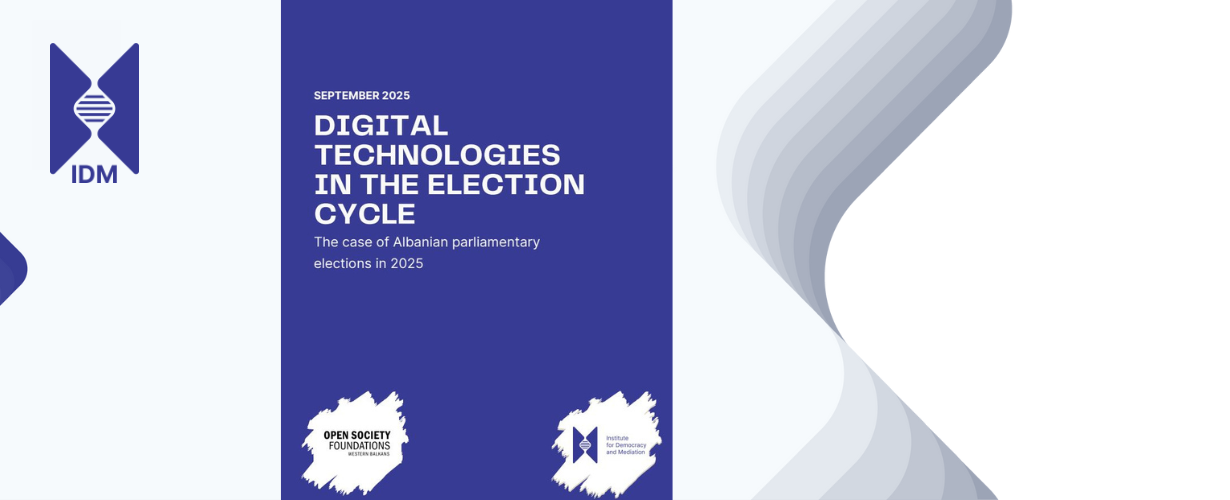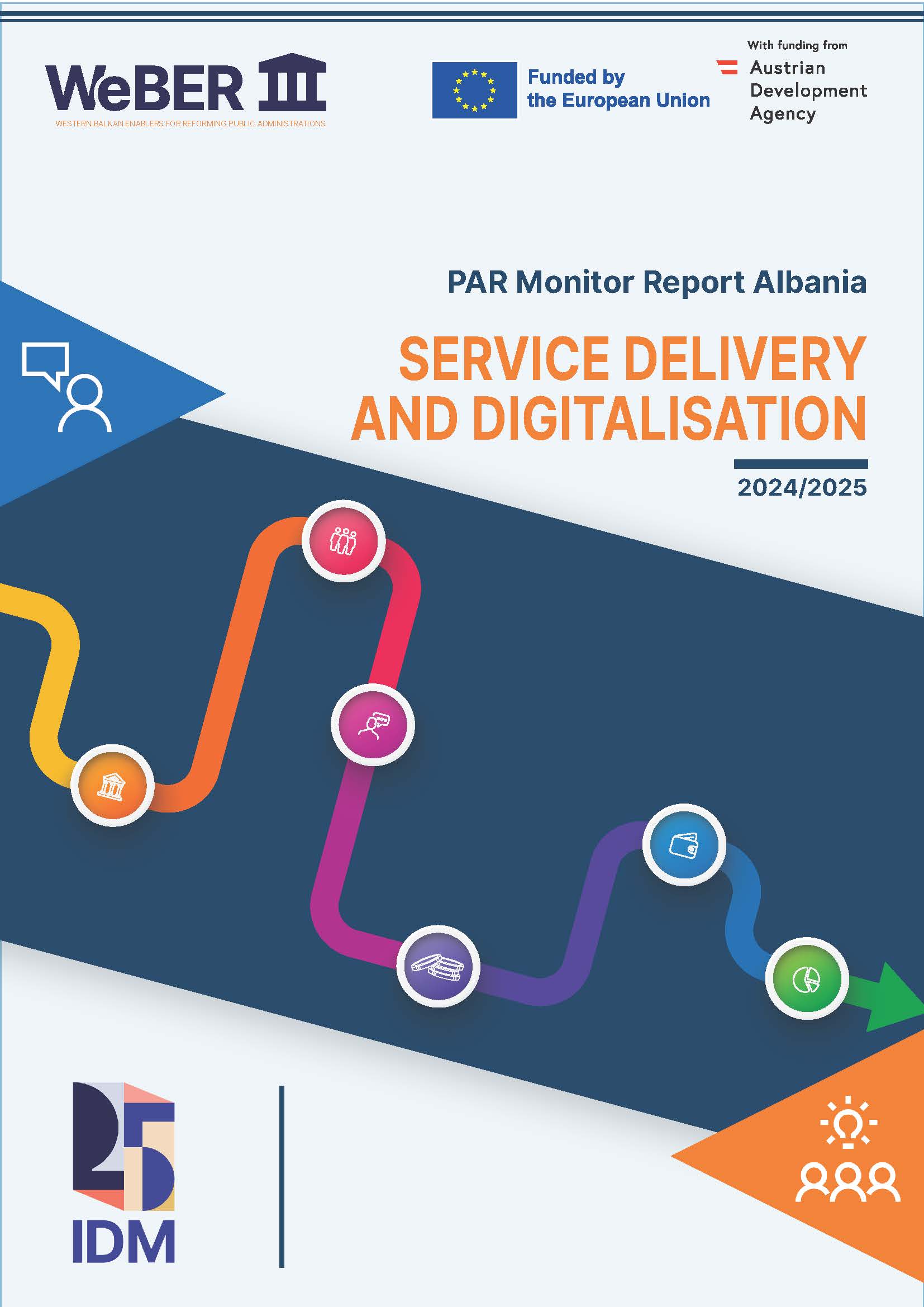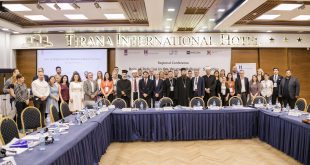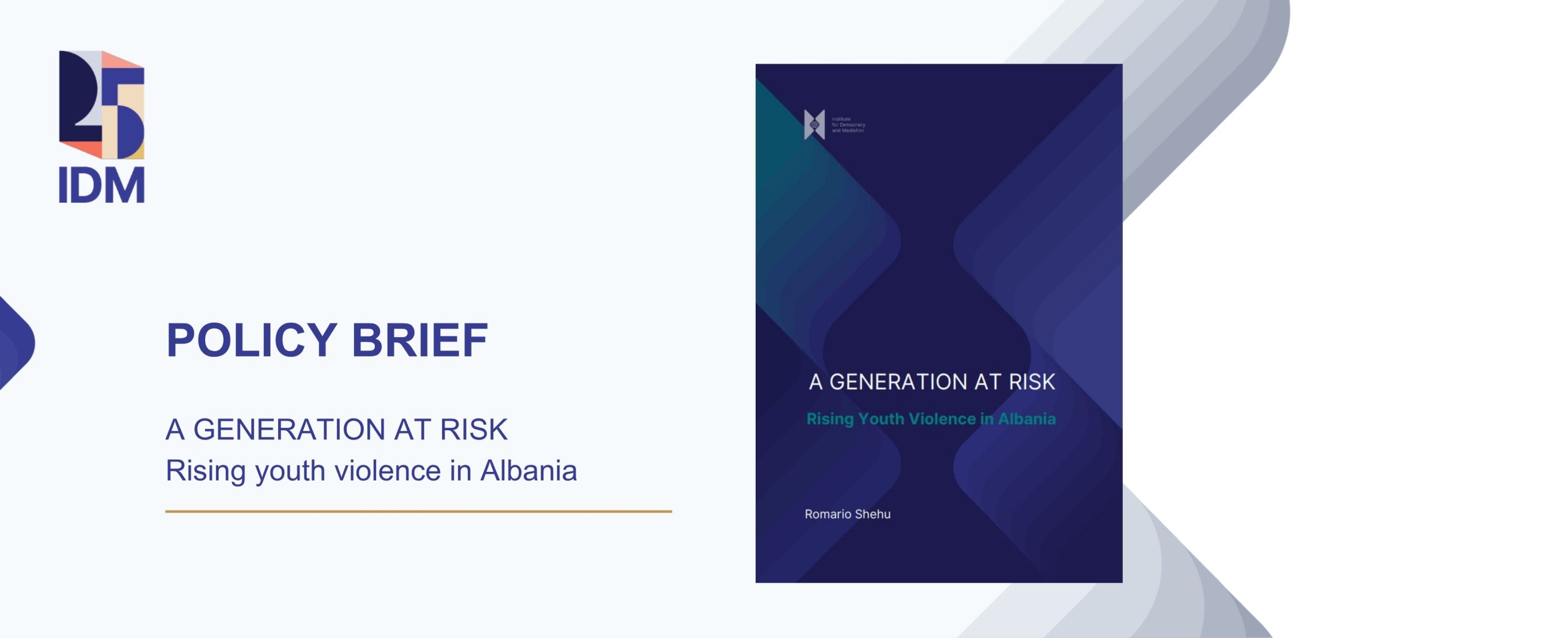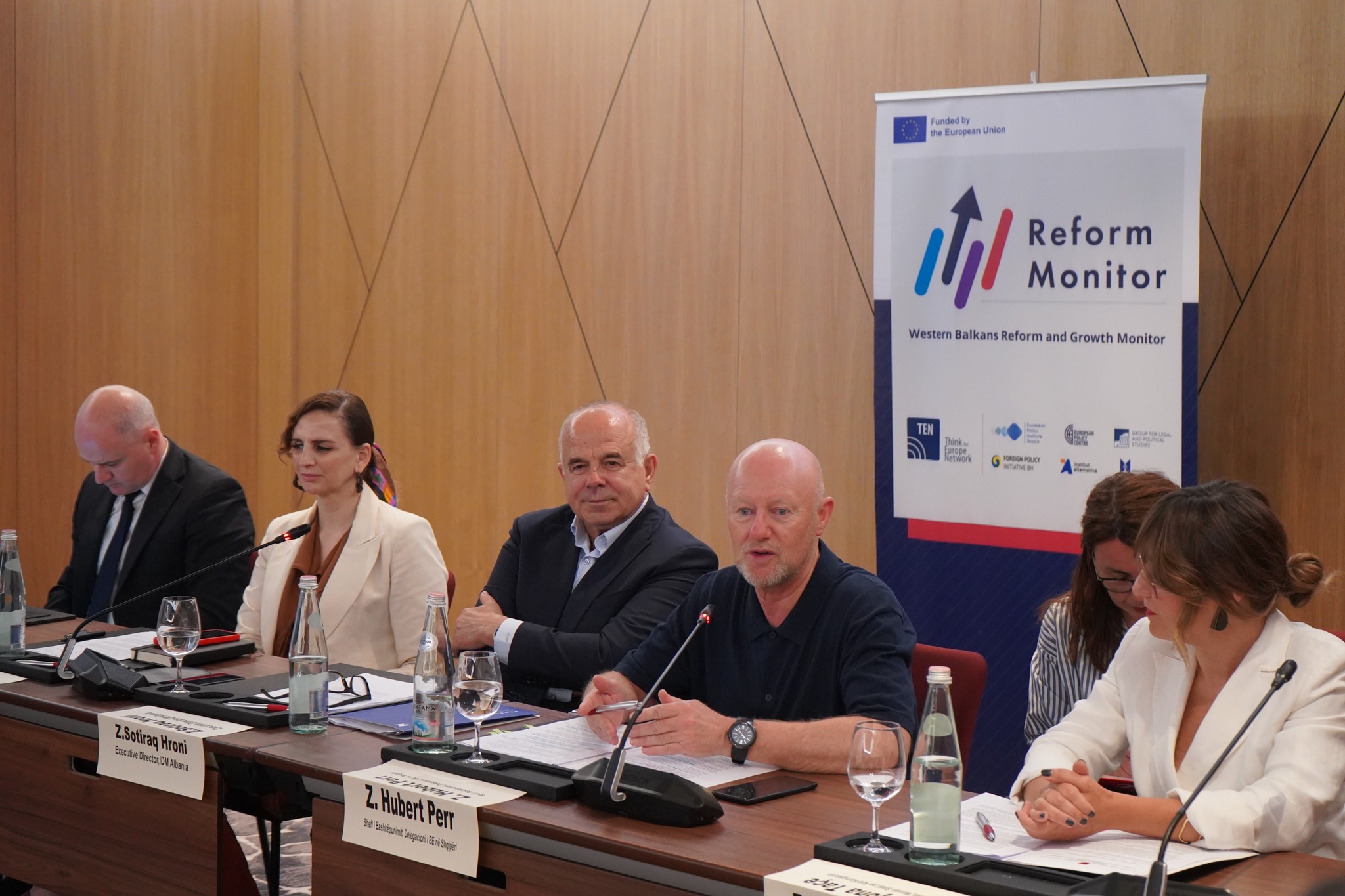The first regional conference on the Role of Religion in Western Balkans Societies
A unique opportunity for religious leaders, policymakers, academia, and civil society of the Western Balkan to discuss challenges and opportunities of religion in multi-religious societies.
Tirana, 11 – 12 June 2019 – This regional conference brought together for the first time the main actors in order to discuss challenges and opportunities of religion in the Western Balkan societies. The conference contributes to the identification of social and political mechanisms in order to be better prepared for a proper approach towards future challenges in our multiethnic region. This helps the preservation and strengthening of the added value of religion to the welfare, social cohesion, development and prosperity in the Western Balkan countries.
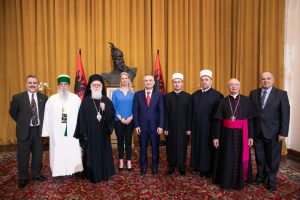 Following the Opening Ceremony of this regional conference, which took place in the Palace of Brigades with the participation of the President of Albania H.E. Mr. Ilir Meta, leaders of religious communities in Albania emphasized the historical role that these communities have played in the protection of religious balance in Albania. They argued that while they are proud of the precious legacy of religious harmony in Albania, they also feel responsible for protecting and developing this legacy for the future generations. Religious leaders emphasized the importance for not politicizing religion, avoiding extremisms, and called for an increased interreligious cooperation among different religious communities in Albania, but also in the Western Balkan countries.
Following the Opening Ceremony of this regional conference, which took place in the Palace of Brigades with the participation of the President of Albania H.E. Mr. Ilir Meta, leaders of religious communities in Albania emphasized the historical role that these communities have played in the protection of religious balance in Albania. They argued that while they are proud of the precious legacy of religious harmony in Albania, they also feel responsible for protecting and developing this legacy for the future generations. Religious leaders emphasized the importance for not politicizing religion, avoiding extremisms, and called for an increased interreligious cooperation among different religious communities in Albania, but also in the Western Balkan countries.
His Excellency Archbishop Anastasios during his speech argued that “for a vision of peaceful coexistence among the peoples of the Balkans to become a reality, new initiatives are needed, with creative thinking and a wider perspective.
” He added that “every type of war or violence in the name of religion is an offense against religion.
” Read full speech in Eng/Alb.
His Excellency H. Bujar Spahiu said that “The religious leaders in Albania are now proud of the legacy that we have inherited from our predecessors, and we feel responsible for preserving this legacy, by having determined commitment to pass it through generations.” Read full speech in Eng/Alb.
His Excellency Archbishop George A. Frendo O.P emphasized “In principle, religions are for peace. If any religion serves to incite struggles, racism, injustice or discrimination, then it is not a true religion, but only a caricature of the same.” He added that “let us be not only guardians of peace, but also prophets and apostles of peace worldwide.” Read full speech in Eng/Alb.
His Excellency Headfather Hajji Dede Edmond Brahimaj said “it is important for us to look back, not in order to create tensions, but in order to look for healing means which can be found in abundance inside our spiritual resources.” He added “We are all the offspring of only one God and sharing love between us is without doubt His will!” Read full speech in Eng/Alb.
His Excellency Ylli H. Doçi argued “religions in Albania coexist in harmony with one-another, and the simple fact of the existence of our religious community, is an evidence of the religious harmony in Albania.” He added “this harmony proves that religious communities in Albania do not seek for hegemony, and that we are united by universal values.” Read full speech in Eng/Alb.
During the 2nd day (12 June), the regional conference gathered leaders of religious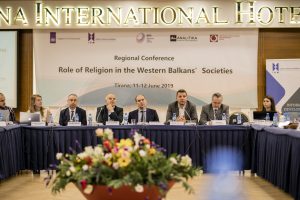 communities, academia, government officials and members of civil society in the Western Balkans. As one of the regions with the greatest religious and ethnic diversity in Europe, the Western Balkans has a rich history of interreligious relations, religious co-existence and interreligious dialogue. This experience is a rich source to be referred to in the framework of the global debate on the role of religion in society.
communities, academia, government officials and members of civil society in the Western Balkans. As one of the regions with the greatest religious and ethnic diversity in Europe, the Western Balkans has a rich history of interreligious relations, religious co-existence and interreligious dialogue. This experience is a rich source to be referred to in the framework of the global debate on the role of religion in society.
The four issues which accompanied the dynamic of the conference were the current state of religious tolerance; the freedom of belief and interreligious relations in the countries of the Western Balkans; security and religion in the Western Balkans; Islam and secularism in the Western Balkans.
In order to enrich the debate on these issues, IDM and its partners prepared a publication which explores the role of religion in the Western Balkans’ societies. This publication is composed of three parts: country snapshots of the Western Balkans countries, reports of surveys directed at the elite which has economic, political and cultural influence and the academic papers written by different authors which were delivered to the conference.
Leonie Vrugtman, during her presentation on the findings from the survey said “In Albania and Kosovo we see more religious harmony than in some other countries. She added that “We see a strong influence of religious leaders in post conflict countries.”
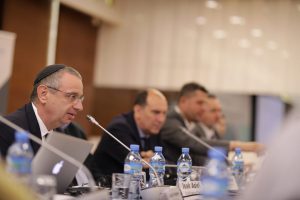 Isak Asiel, the Chief Rabbi of the Jewish Community in Belgrade, argued that “We should be providers and not receivers, we need to create an atmosphere where kids won’t leave our societies.”
Isak Asiel, the Chief Rabbi of the Jewish Community in Belgrade, argued that “We should be providers and not receivers, we need to create an atmosphere where kids won’t leave our societies.”
Ylli Doçi while presenting his paper emphasized that “tolerance is not a given, it should be a cultural achievement of every generation.” He added that “we should not believe that the religious harmony in Albania will stay as it is if we do not protect it.” According to him, the Interreligious Council of Albania should be promoted as a model in the other countries in the region.
Father Photius from North Macedonia, argued during his speech that “We need to concentrate our attention at what to teach to the youth not only by preaching but by our behaviour. Moreover, he added that “We need to offer them real models, because that’s our mission.”
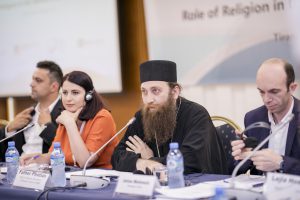
Jeton Mehmeti, while presenting his article on “The struggle of Kosovo policymakers to upgrade the law on religious affairs”, stressed that “there is a need to amend the law on religions in Kosovo since religious communities are not recognized as legal entities by the state this brings negative consequences.
Mladen Mrdalj argued during his speech that “If a religion approaches the state and asks state enforcement of religious rules, that is when that religion fails. Religious leaders should practice what they preach.”
Julianne Funk, during the presentation of her paper on “Religions as loci of conflict prevention: local 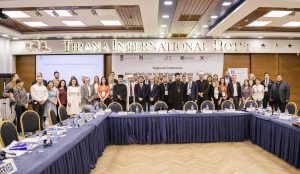 capacities of Bosnia and Herzegovina’s religious communities”, highlighted that “religious actors can foster a transformative encounter by engaging rather than disengaging communities.”
capacities of Bosnia and Herzegovina’s religious communities”, highlighted that “religious actors can foster a transformative encounter by engaging rather than disengaging communities.”
Muhamed Hadžić, Chief Imam of Belgrade stated during his speech that “a secular state is a democratic state that guarantees equal rights to all citizens. The citizens of the WB are the ultimate witnesses of this aspect.”
Zora Hesova, while presenting her paper on “Islamic tradition”: questioning the Bosnian model” argued that “Muslim institutions in Bosnia and Herzegovina have been standing between foreign support and self-autonomy.” According to her, the biggest actual challenge is polarization of Islamic world.

